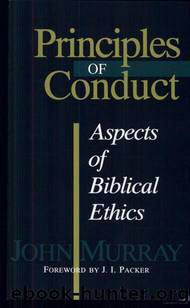Principles of Conduct: Aspects of Biblical Ethics by John Murray

Author:John Murray [Murray, John]
Language: eng
Format: epub
Tags: Bybel, Christelike Lewe, Bible, Christian Life, Religion, Ethics, Ethics in the Bible, Christian Theology
ISBN: 9780802811448
Publisher: Wm. B. Eerdmans Publishing
Published: 0101-01-01T00:00:00+00:00
Chapter VII
OUR LORD'S TEACHING
No part of Scripture is more relevant to the question of the biblical ethic than the teaching of our Lord in what is called the sermon on the mount. A large section of that discourse is concerned with the relation to the law of God of the order of things which Jesus came into the world to establish. And as we focus attention upon the precise question of the relations of love and law in the kingdom of God, nothing could be more germane than the deliverances of our Lord on this occasion. That part of the discourse with which we are particularly concerned begins with these striking words: 'Do not think that I came to destroy the law or the prophets; I came not to destroy but to fulfil' (Matthew 5: 17). Jesus is not reflecting primarily on the keeping of the law or commandments of God; he does that later on. Here he is dealing with a much deeper question. The exact force of this word is to be derived from the two pivotal verbs, 'destroy' and 'fulfil'. The meaning of 'destroy'1 is not to break or transgress but to dissolve. It is similar to our English word 'abrogate' or, as in Wiclif's translation, 'undo'. Jesus says that he did not come to abrogate the law or the prophets. The law and the prophets should be regarded as embracing the whole of the Old Testament canon. So Jesus says that he did not come to abrogate any of the existing Scriptures.
Just as the word 'destroy' does not mean simply to break or transgress, so the word 'fulfil' does not mean merely to keep or obey. And it is this word 'fulfil' that needs to be assessed if we are to appreciate Jesus' positive assertion. The substantive form of this word, often rendered 'fulness', means the full tale, the full
1 The Greek word is kataluw. In Joseph Addison Alexander's words (Comm. ad loc.) it means the 'dissolution or disintegration, the destruction of a whole by the complete separation of its parts, as when a house is taken down by being taken to pieces, the very act denoted by the verb in the passage just cited (Matthew 26: 61; 27: 40). In the same sense, but with a figurative application, Paul employs it to describe the dissolution of the body (2 Cor. 5, 1), and of a system of belief and practice (Gal. 2, 18), which last is precisely its use here.'
measure or complement of something.2 Hence what Jesus means is that he came to realize the full measure of the intent and purpose of the law and the prophets. He came to complete, to consummate, to bring to full fruition and perfect fulfilment the lawT and the prophets. Jesus refers to the function ofvalidating and confirming the law and the prophets and includes much more than the fulfilment of the predictions of the Old Testament regarding himself. He means that the whole process of revelation deposited in the Old Testament finds in him its completion, its fulfilment, its confirmation, its validation.
Download
This site does not store any files on its server. We only index and link to content provided by other sites. Please contact the content providers to delete copyright contents if any and email us, we'll remove relevant links or contents immediately.
The Lost Art of Listening by Michael P. Nichols(7506)
Why I Am Not A Calvinist by Dr. Peter S. Ruckman(4153)
The Rosicrucians by Christopher McIntosh(3519)
Wicca: a guide for the solitary practitioner by Scott Cunningham(3177)
Signature in the Cell: DNA and the Evidence for Intelligent Design by Stephen C. Meyer(3138)
Real Sex by Lauren F. Winner(3022)
The Holy Spirit by Billy Graham(2952)
To Light a Sacred Flame by Silver RavenWolf(2823)
The End of Faith by Sam Harris(2741)
The Gnostic Gospels by Pagels Elaine(2530)
Waking Up by Sam Harris(2459)
Nine Parts of Desire by Geraldine Brooks(2368)
Jesus by Paul Johnson(2361)
Devil, The by Almond Philip C(2331)
The God delusion by Richard Dawkins(2309)
Heavens on Earth by Michael Shermer(2284)
Kundalini by Gopi Krishna(2184)
Chosen by God by R. C. Sproul(2164)
The Nature of Consciousness by Rupert Spira(2108)
